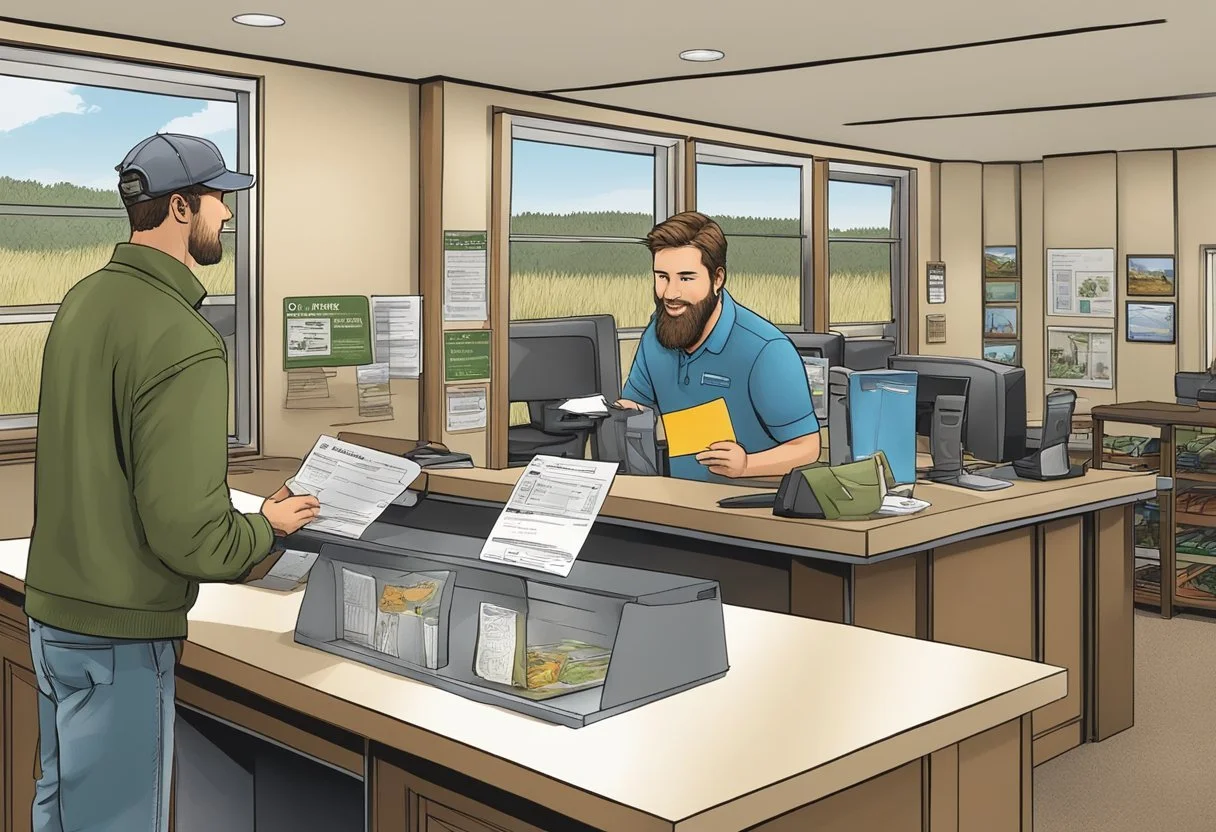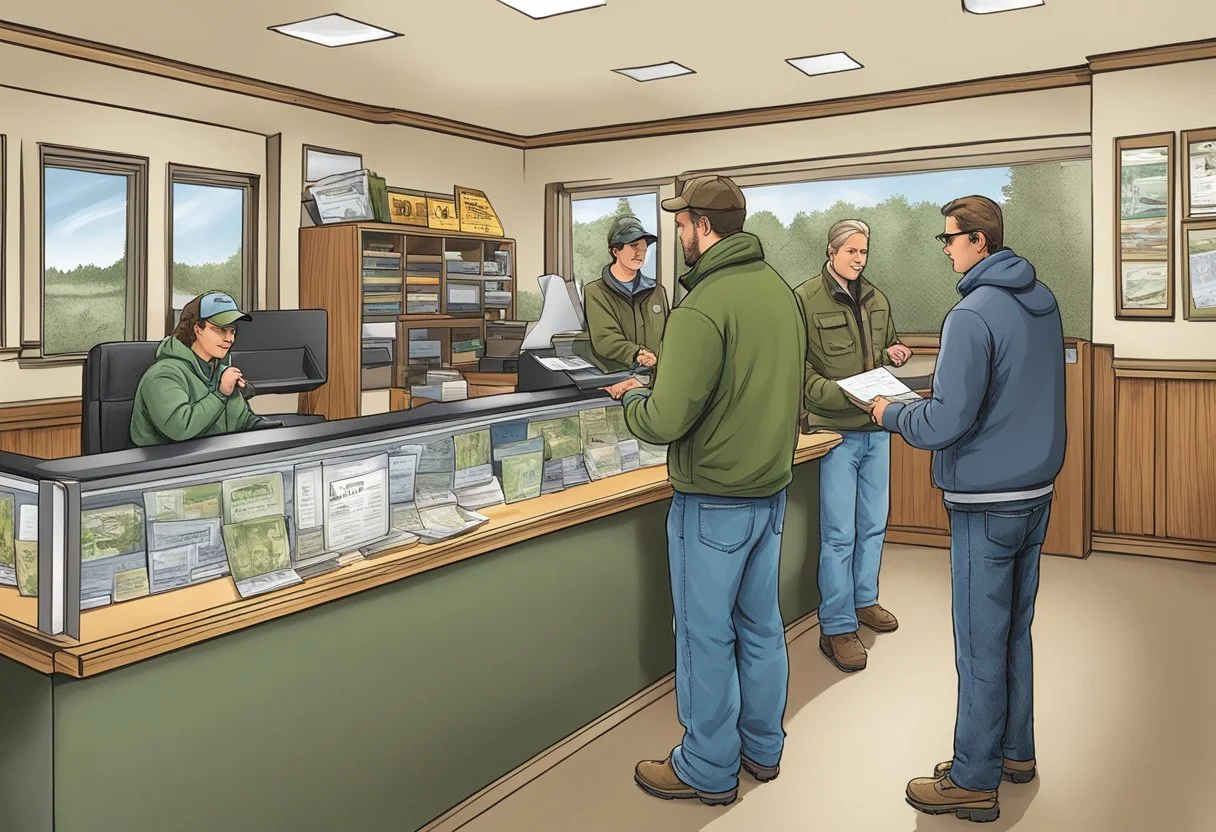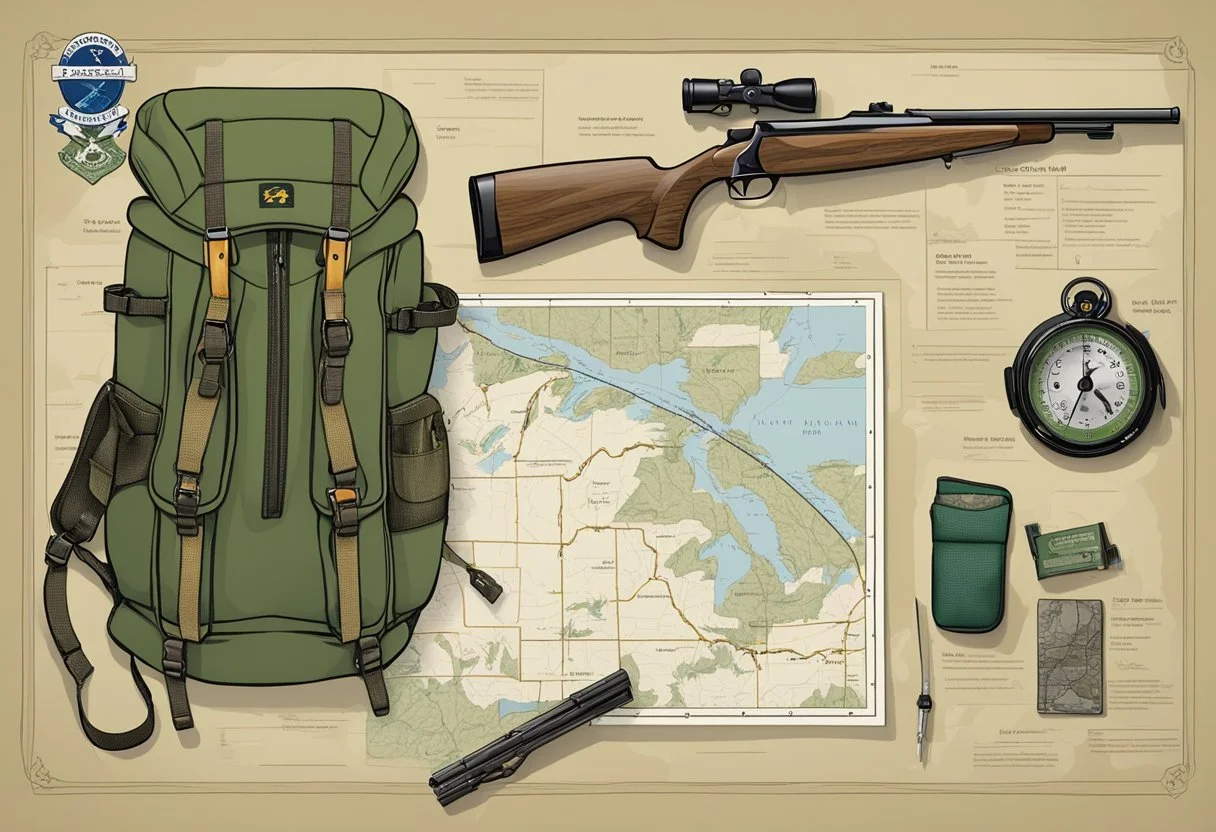How to Get a Michigan Non Resident Hunting License
Your Guide to Out-of-State Hunting Permits
This Article is Part of Our Guide to Non Resident Hunting Licenses by State
Michigan offers a wealth of diverse hunting opportunities, which often attracts nonresidents interested in pursuing game in the state. Nonresident hunters must first obtain a base license before they can hunt in Michigan, which is a prerequisite for purchasing additional hunting licenses for specific species. The base license enables the holder to hunt small game and is also necessary for those seeking to hunt other types of game.
As of the most recent information available, the cost for a nonresident base license in Michigan is set at $151. This fee is a mandatory initial step for nonresident hunters, which upon acquisition, allows them to add specific tags for the kind of hunt they are interested in, such as deer hunting. Special tags, like those for antlered deer, will incur additional costs on top of the base license fee.
It is important for nonresidents to also be aware of the identification requirements when applying for a hunting license in Michigan. Acceptable forms of identification include a valid nonresident driver’s license or a state-issued ID card. Moreover, regulations and other pertinent updates related to hunting laws can be easily accessed, ensuring that all hunters are well-informed and compliant with state hunting regulations.
Eligibility and Requirements
When acquiring a Michigan nonresident hunting license, one must navigate through a set of eligibility criteria and requirements. These conditions ensure legal and regulated hunting experiences within the state.
Age and Residency
Nonresident hunters of any age are permitted to apply for a Michigan hunting license. However, specific licenses vary as follows:
Junior Base License: Available for hunters under the age of 17.
Adults: Standard nonresident license fees apply.
Seniors: Individuals aged 65 and above, who are Michigan residents, are eligible for discounted rates.
Michigan defines a nonresident as anyone who does not reside in Michigan or has not lived in the state for at least six months prior to the application for a license.
Hunter Safety Certification
To purchase a hunting license in Michigan:
All first-time hunters born on or after January 1, 1960, must present a Hunter Education Certificate.
Nonresidents may provide a hunter safety certificate from their home state.
An Apprentice License is available for those wishing to hunt while accompanied by a licensed adult, bypassing the immediate need for hunter safety certification.
License Types and Options
Various license types are available to nonresident hunters:
Base License: Required for all hunters and allows for the purchase of additional permits.
Deer Combo License or a Universal Antlerless Deer License: For deer hunting, catering to different hunting preferences.
Fur Harvester License: Permits the hunting or trapping of fur-bearing animals.
Waterfowl License: Specifically for hunting waterfowl species.
Nonresident Fishing License: For those who also wish to fish, available separately or as part of a Hunt/Fish Combo.
Permits are strictly for the species and seasons designated. Hunters may also explore specialty licenses such as the Mentored Youth Hunting License, designed to introduce hunting to the younger population under a mentor's guidance.
License Acquisition Process
Acquiring a non-resident hunting license in Michigan involves selecting the right purchase method, providing necessary documentation, and understanding the applicable fees.
Purchasing Channels
Non-residents can purchase Michigan hunting licenses through several channels:
Online: Via the Michigan Department of Natural Resources (DNR) eLicense website at Michigan.gov/DNRLicenses.
Mobile App: Using the Michigan DNR HuntFish app.
In-Person: At any authorized license agent throughout Michigan; a directory is accessible at Michigan.gov/DNRLicenseAgents.
Required Documentation
When purchasing a license, the following documentation is typically required:
Proof of Identity: Government-issued photo identification.
DNR Sportcard: If one does not have a previous Michigan hunting license, a DNR Sportcard is needed, which can be obtained simultaneously with the license.
Licenses can be reprinted if necessary by accessing the DNR eLicense system or by visiting an authorized license agent.
License Fees
The fees for non-resident hunting licenses in Michigan are as follows:
All fees are subject to change, and it is advisable to confirm current rates on the DNR's official channels before making a purchase.
Hunting Regulations
In Michigan, nonresident hunters must adhere to specific regulations when pursuing game. These include species and bag limits, designated hunting seasons, legal practices, and the equipment permitted for use.
Species and Bag Limits
Deer Hunting: A base hunting license allows hunters to pursue small game species. For deer, a separate tag is required; nonresident base licenses are $151 with an additional $20 for an antlered deer tag. Elk and Other Species: Specific permits are needed for elk, with highly regulated seasons and bag limits. Other game animals such as quail (What wine goes well with quail?), coyote, and certain migratory birds have distinct bag limits, often dictated by the Michigan Department of Natural Resources (DNR).
Seasons and Time Frames
Each species has set seasons and time frames to regulate hunting throughout the year. For example:
Small Game: Generally includes early fall to late winter.
Deer: Regulated by archery, regular firearm, and muzzleloader seasons.
Elk Season: Limited entry with specific periods typically set in the fall.
Migratory Birds: Fall wild turkey and other species are regulated under federal and state guidelines, requiring adherence to set seasons.
Legal Hunting Practices
Hunters in Michigan must obtain the proper licenses and adhere to the DNR’s guidelines, which stipulate:
Hunting on public lands and private property with the required permissions.
Compliance with DMU 487 regulations in disease management areas like Emmet or Bay County.
Adhering to the rules set by the DNR regarding private landowners in areas like Osceola and South Fox Island.
Firearm and Equipment Rules
The state of Michigan allows a variety of hunting equipment, including:
Firearms: Shotguns, rifles, and handguns are permissible according to the season and hunting area.
Archery: Crossbows and bows are allowed during archery deer season under specified guidelines.
Muzzleloaders: These firearms are typically used during a specific late-season period.
Hunters must follow all regulations, including firearm transport and usage on public and private lands, and all relevant safety laws.
Special Licenses and Permits
Michigan offers an array of special licenses and permits tailored to meet the needs of diverse groups of hunters, ensuring opportunities are accessible to everyone who wishes to participate in the state's hunting traditions.
Mentor and Apprentice Opportunities
Michigan encourages new hunters to participate in the sport through its Mentor and Apprentice Programs. The Mentored Youth Hunting License is available for youth under the age of 10, which includes a base apprentice license, and permits for hunting, fishing, and trapping. For first-time hunters over the age of 10 who have not completed hunter education, the Base Apprentice License invites them to hunt alongside a mentor.
Disability Access Permits
Individuals with disabilities can obtain Disability Access Permits, which are designed to provide accommodations that enhance access to hunting experiences. These permits are part of Michigan's commitment to ensure hunting remains inclusive, enabling those with physical limitations to enjoy outdoor activities with less hindrance.
Reserved and Special Hunt Applications
Hunters can apply for certain reserved hunts and special licenses through the Michigan Department of Natural Resources (DNR). Applications for reserved hunts allow hunters to participate in limited and controlled hunting experiences, such as reserved deer hunts at specific locations. The application process is structured to manage wildlife populations effectively while providing unique hunting opportunities.
Conservation and Management
Michigan's approach to conservation and management of its wildlife is guided by regulations set forth by the Michigan Department of Natural Resources (DNR). These rules aim to sustain healthy wildlife populations while enabling regulated hunting opportunities for residents and non-residents alike. The focus is on science-based strategies to prevent the spread of diseases like chronic wasting disease and maintaining diverse habitats.
Wildlife Conservation Efforts
The Michigan DNR actively monitors the health of various wildlife populations to ensure that hunting practices are sustainable. Chronic wasting disease (CWD), a fatal neurological illness affecting deer, moose, and elk, is under stringent surveillance and management. The state regulations mandate testing in certain areas to control its spread, protecting both the health of the animals and the interests of the hunting community.
Regulated hunting seasons ensure that wildlife populations are not overharvested.
The Michigan base hunting license, required for all hunters, directly supports conservation efforts.
Youth and senior licenses offer reduced rates to encourage participation in regulated hunting.
Habitat Preservation Measures
Michigan's varied ecosystems, from forests and wetlands to prairies, are essential for the wellbeing of game species and non-game wildlife. The Department of Natural Resources implements measures to maintain, restore, and protect these critical habitats.
Conservation programs focus on land management practices that benefit wildlife and promote biodiversity.
Efforts include the control of invasive species, which threaten native habitats and the wildlife that depends on them.
Partnerships with local communities and organizations help to bolster preservation endeavors and raise awareness of the need for active habitat management.
Supplementary Resources
When seeking to obtain a nonresident hunting license in Michigan, additional resources offered by the state can enhance the hunting experience. From interactive maps to educational programs, Michigan facilitates a comprehensive approach to support hunters before, during, and after their outdoor activities.
Hunting Guides and Maps
Michigan's Department of Natural Resources (DNR) provides various guides and mapping tools to assist hunters. MI-Hunt, a mapping application, allows hunters to locate public hunting land as well as to view different habitats, aerial photography, and topography. Additionally, Michigan offers detailed fishing guides and maps for those interested in angling, highlighting lakes and rivers along with the types of fish available. This information is crucial for hunters and anglers seeking location-specific regulations and opportunities.
Hunter Education Programs
Michigan mandates that all new hunters born on or after January 1, 1960, complete a hunter education program to purchase a hunting license. The DNR offers traditional classroom courses, online study options, and field instruction. Upon successful completion of the program, participants receive a hunter education certificate that is recognized across North America. The state also provides youth hunting licenses to encourage the safe and responsible introduction of young individuals to hunting.
Reporting and Compliance Procedures
After the hunt, Michigan requires hunters to comply with reporting and compliance procedures to ensure the conservation and management of wildlife populations. Hunters must utilize kill tags correctly and report harvest information as specified by the DNR. Michigan's Harvest Information Program (HIP) for waterfowl hunters is in place alongside the need for a Federal Duck (What wine goes well with duck?) Stamp when hunting duck and geese. Additionally, hunters can check the status of their deer or elk license lab results for disease testing, which is particularly relevant in known areas of concern such as the Upper Peninsula. This adherence to regulations is essential for maintaining the natural balance and continued viability of outdoor recreation in Michigan.
Additional Considerations
When purchasing a non-resident hunting license in Michigan, several additional considerations play a critical role in maintaining both the ecosystem and adherence to legal and economic frameworks. These considerations ensure the hunting experience is beneficial to both the hunter and the local environment.
Wildlife Health and Disease
Monitoring wildlife health, particularly in relation to Chronic Wasting Disease (CWD), is crucial. Michigan authorities require hunters to stay informed about CWD-affected areas and comply with regulations designed to prevent its spread. Deer licenses may come with specific instructions for submitting samples for disease testing. This not only helps preserve Michigan's wildlife populations but also safeguards the quality of hunting for future seasons.
Legal Implications for Violations
Adhering to Michigan's hunting regulations, including those for deer tag use during firearm season and the purchase of an antlerless deer hunting access permit, is a legal necessity. Violations can result in fines, revocation of hunting privileges, or other legal actions. Hunters should ensure they understand the limits and requirements of their permits to avoid unintentional infractions.
Economic Impact on Local Communities
Hunting licenses, including those for non-residents, contribute significantly to Michigan's economy, particularly in rural areas. Revenue from hunting license sales supports not just wildlife management but also outdoor recreation infrastructure. Local businesses depend on hunters for trade during hunting seasons, underscoring the importance of this activity for community economic health.
Frequently Asked Questions
What is the cost of a Michigan nonresident hunting license?
A nonresident base hunting license is priced at $151. This allows the individual to hunt small game and is a prerequisite for purchasing additional licenses.
Can a nonresident purchase a deer license in Michigan?
Yes, nonresidents can purchase a deer tag for an additional $20, valid for one antlered deer. They must first acquire the base hunting license.
Is there a combination license available for nonresidents in Michigan?
The search results do not provide direct information on the availability and cost of a combination license for nonresidents.
Are there any age-based discounts available for nonresidents?
Michigan provides discounted licenses for certain resident groups (seniors, juniors), but the search results provided do not specify discounts for nonresident age groups.
What identification is required to purchase a hunting license in Michigan?
Nonresidents must present a valid nonresident driver's license or other official identification to purchase a hunting license.
Where can one find more detailed information about Michigan hunting regulations?
The Michigan Hunting Digest is a comprehensive resource outlining regulations and guidelines. Additionally, the Department of Natural Resources (DNR) website and the DNR Hunt Fish app offer detailed information.
Please note that license costs and requirements may change, so it's essential to check the latest information from the Michigan Department of Natural Resources before planning a hunting trip.
Contact Information
When seeking information on Michigan non-resident hunting licenses, individuals should consult directly with official sources such as government and regulatory bodies and local hunting clubs. These entities provide authoritative and current details.
Government and Regulatory Bodies
Michigan Department of Natural Resources (DNR) is the primary government authority for all hunting-related regulations and licensure. They provide information on various licenses including those required by non-residents for hunting in Michigan.
Phone Support: Contact the Michigan DNR Helpdesk at (517) 284-6057 for direct assistance.
Online License Purchase and Info: Visit Michigan.gov/DNRLicenses for information on purchasing licenses, permits, applications, or to reprint an existing license.
Local Hunting Clubs and Organizations
Local hunting clubs typically have resources and may offer advice on obtaining non-resident hunting licenses. They often work closely with the Michigan DNR and can provide up-to-date information based on practical experience.
Contacting Clubs: It is advisable for individuals to locate specific local clubs in the area they wish to hunt and reach out directly for the most pertinent advice.
Club Meetings and Events: Attending events or meetings can be a valuable opportunity for direct communication and networking with experienced hunters familiar with Michigan's regulations.
#MichiganHuntingLicense #NonResidentHunting #OutofStateHunting #HuntingPermits #WildlifeConservation #OutdoorAdventures #HuntingRegulations






